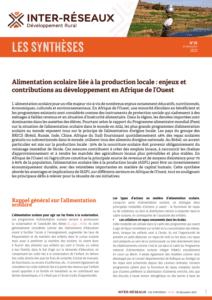Economic Partnership Agreements (EPA) are shortly to be signed between the European Union (EU) and the African, Caribbean and Pacific countries (ACP) and should become effective in January 2008. These agreements will establish free-trade areas between the EU and each one of the six ACP regions. The EU’s main argument in support of establishing the EPAs is that the current EU-ACP trade cooperation rules do not comply with WTO rules.
The EPA concept was formed in the mid-90s, when the world still believed in the virtues of free trade. Ten years later, this belief has somewhat evaporated! But in the absence of a clear-cut alternative – the Doha round is at a standstill – things are being allowed to continue on the initial course. Admittedly, the mobilisation of civil society stakeholders and certain ACP countries will help protect the major products that are sensitive to trade-opening measures. But this will only limit the damage for EPA opponents, and reduce the benefits of reform for its supporters.
Never do you see trade serving the cause of human development. Neither do you see the goals of fair trade (respect of land, resources and people) being integrated as official trade objectives.
Once again, an international agreement is providing answers to yesterday’s problems, but refrains from addressing tomorrow’s challenges. The big reform that would see the ACP-EU partnership establish itself as a new laboratory of equitable North-South and South-South international relations is yet to be devised. Many stakeholders have invited themselves to the EPA debate, both in ACP countries as well as in Europe. If we were all prepared to shake up the comfortable status quo and relinquish our entrenched positions, then we could really hope to devise and implement such a reform! The ACP-EU relations system is based on three main dimensions, policy, trade and development. ACP-EU trade cooperation must be built as one of the elements of an overall development strategy and not as an end in itself. In that vein, trade development requires rules that, while being effective, must also be equitable. The WTO is a policy forum within which the ACP-EU duo could jointly exert pressure to defend other approaches, other more balanced and human development-friendly rules. The EU and the ACP countries wield significant political impact: 105 countries grouping slightly over one billion inhabitants and, within the WTO, 83 members out of 150.
Could the ACP-EU zone become a real platform for policy dialogue and negotiation of rules that are not subjected to market laws alone? This is a matter of political will. But does the EU have this political will, when it constitutes the major donor of the ACP countries and one of the largest centres for global trade?







